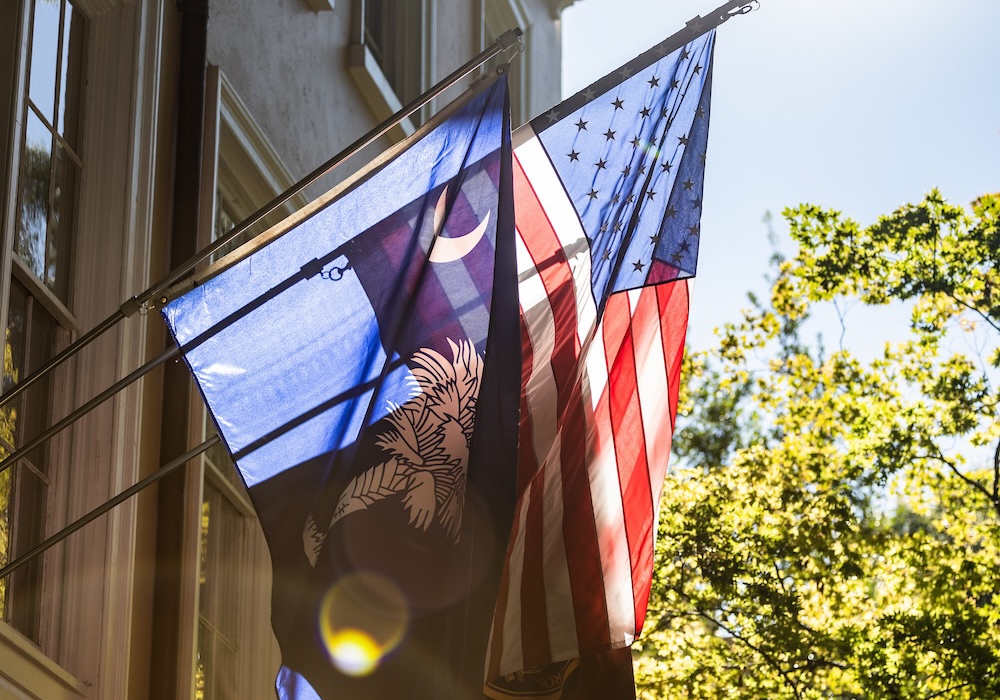The University of South Carolina is creating a new academic center to promote broad understanding of the core ideals and values that have shaped American government and history. The Center for American Civic Leadership and Public Discourse will generate scholarship and new academic programs exploring ordered liberty, democratic self-governance, rule of law and unalienable rights, while also promoting bipartisan discussion of the critical issues facing our nation and state.
The Board of Trustees approved the new center unanimously on June 20, and planning for public events and academic programs supporting its mission is underway.
“Studying the American civic order and teaching our students to be good citizens should be a core function of higher education in America,” said Thad Westbrook, chair of the USC Board of Trustees. “With the upcoming 250th anniversary of the Declaration of Independence, this is a great opportunity for the University of South Carolina to launch a new effort to contribute scholarship on American democracy and lead the way in our state in educating South Carolinians in America’s founding principles. Over the past few years, we have strengthened our policies supporting free speech on campus, and we believe this center will elevate that work with a renewed focus on civil discourse.”
The center responds to a growing need for civil discourse, cooperation across partisan lines, and a greater understanding of the core ideals and values that shaped America.
“Embodied in our educational mission is a commitment to preparing USC’s students to succeed and lead in every facet of their lives beyond graduation,” USC President Michael Amiridis said. “The value this new academic center brings is its focus on equipping students with the knowledge, perspectives, and reasoning skills for meaningful interactions as citizens and community leaders.”
Numerous studies and surveys reveal that Americans have less trust in government and each other than in the past. Too many of our citizens lack a basic understanding of American government, which is particularly worrisome when political polarization is prevalent throughout our nation.
Housed in the McCausland College of Arts and Sciences, the Center for American Civic Leadership and Public Discourse will help USC contribute to the national dialogue on issues in American democracy through highly respected scholars, hosting national and state leaders, and public discussions with students, faculty, staff, and South Carolina community members of varying backgrounds and political viewpoints.
Christopher Tollefsen, a professor of philosophy who studies ethics and natural law, will serve as the center’s interim executive director in its first year. Other USC faculty affiliated with the center include scholars of history, political science, sociology, law and education.
The center has a board of external advisors that include Robert P. George of Princeton University, Cornel West of Union Theological Seminary, Julia Mahoney of the University of Virginia, Paul Carrese of Arizona State University, and Mary Keys of the University of Notre Dame.
“From its beginning, the Center for American Civic Leadership and Public Discourse will help students and citizens in South Carolina truly grasp the ideas and values that have both inspired and challenged Americans of each generation,” Tollefsen said. “Our academic programs, publications and public events will bring together people of diverse backgrounds and beliefs to better understand America’s past and prepare to shape its future.”
For its first public event, on Sept. 12 the center will welcome advisory board members Robert P. George and Cornel West, who are well-known for their collaboration and friendship, despite their disagreement on many issues. On Sept.17, the center will host Emory legal scholar John Witte for a Constitution Day lecture about religious freedom.
The center has received key approval from the Commission on Higher Education’s academic affairs and licensing committee pending final approval. Future events will address topics such as South Carolina’s contributions to America’s founding, the rule of law, ethics, history and more.
The center will support existing academic programs, such as the minor in Law and Society and courses on America’s founding documents, while exploring new academic offerings.
For more information about the center, visit go.sc.edu/CivicLeadership.
